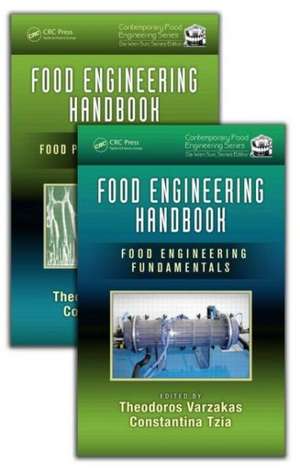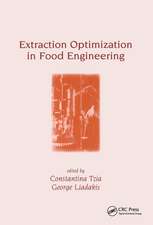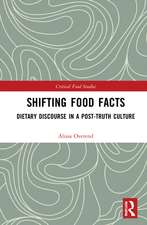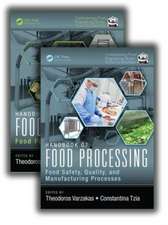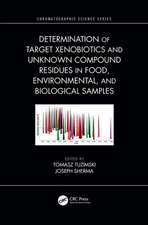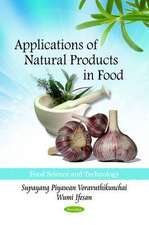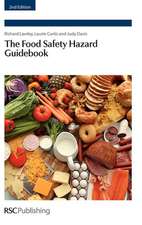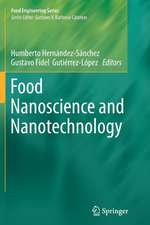Food Engineering Handbook, Two Volume Set: Contemporary Food Engineering
Editat de Theodoros Varzakas, Constantina Tziaen Limba Engleză Hardback – 12 dec 2014
Comprised of Food Engineering Handbook: Food Engineering Fundamentals and Food Engineering Handbook: Food Process Engineering, this comprehensive resource:
- Explains the interactions between different food constituents that might lead to changes in food properties
- Describes the characterization of the heating behavior of foods, their heat transfer, heat exchangers, and the equipment used in each food engineering method
- Discusses rheology, fluid flow, evaporation, distillation, size reduction, mixing, emulsion, and encapsulation
- Provides case studies of solid–liquid and supercritical fluid extraction and food behaviors
- Explores fermentation, enzymes, fluidized-bed drying, and more
Din seria Contemporary Food Engineering
- 9%
 Preț: 694.92 lei
Preț: 694.92 lei - 24%
 Preț: 485.49 lei
Preț: 485.49 lei - 28%
 Preț: 1475.18 lei
Preț: 1475.18 lei - 18%
 Preț: 709.45 lei
Preț: 709.45 lei - 15%
 Preț: 669.94 lei
Preț: 669.94 lei - 28%
 Preț: 1363.02 lei
Preț: 1363.02 lei - 28%
 Preț: 993.44 lei
Preț: 993.44 lei - 18%
 Preț: 1834.06 lei
Preț: 1834.06 lei - 29%
 Preț: 1351.60 lei
Preț: 1351.60 lei - 15%
 Preț: 669.94 lei
Preț: 669.94 lei - 15%
 Preț: 540.06 lei
Preț: 540.06 lei - 27%
 Preț: 524.78 lei
Preț: 524.78 lei - 15%
 Preț: 500.33 lei
Preț: 500.33 lei -
 Preț: 455.78 lei
Preț: 455.78 lei - 18%
 Preț: 718.13 lei
Preț: 718.13 lei - 18%
 Preț: 1336.32 lei
Preț: 1336.32 lei - 24%
 Preț: 476.05 lei
Preț: 476.05 lei - 9%
 Preț: 1355.15 lei
Preț: 1355.15 lei - 18%
 Preț: 700.75 lei
Preț: 700.75 lei - 18%
 Preț: 1359.95 lei
Preț: 1359.95 lei - 25%
 Preț: 552.60 lei
Preț: 552.60 lei - 29%
 Preț: 1101.89 lei
Preț: 1101.89 lei - 14%
 Preț: 2143.53 lei
Preț: 2143.53 lei - 25%
 Preț: 1112.81 lei
Preț: 1112.81 lei - 28%
 Preț: 1045.74 lei
Preț: 1045.74 lei - 18%
 Preț: 705.50 lei
Preț: 705.50 lei - 18%
 Preț: 1346.58 lei
Preț: 1346.58 lei - 28%
 Preț: 989.77 lei
Preț: 989.77 lei - 18%
 Preț: 1256.42 lei
Preț: 1256.42 lei - 18%
 Preț: 1671.73 lei
Preț: 1671.73 lei - 30%
 Preț: 935.69 lei
Preț: 935.69 lei - 18%
 Preț: 1277.90 lei
Preț: 1277.90 lei - 29%
 Preț: 1246.37 lei
Preț: 1246.37 lei - 18%
 Preț: 1815.14 lei
Preț: 1815.14 lei - 25%
 Preț: 473.94 lei
Preț: 473.94 lei - 28%
 Preț: 987.72 lei
Preț: 987.72 lei - 28%
 Preț: 1415.04 lei
Preț: 1415.04 lei - 29%
 Preț: 1184.60 lei
Preț: 1184.60 lei - 28%
 Preț: 1413.83 lei
Preț: 1413.83 lei - 29%
 Preț: 1239.41 lei
Preț: 1239.41 lei
Preț: 1850.48 lei
Preț vechi: 2664.48 lei
-31% Nou
Puncte Express: 2776
Preț estimativ în valută:
354.14€ • 368.36$ • 292.36£
354.14€ • 368.36$ • 292.36£
Carte tipărită la comandă
Livrare economică 15-29 aprilie
Preluare comenzi: 021 569.72.76
Specificații
ISBN-13: 9781466582262
ISBN-10: 146658226X
Pagini: 944
Ilustrații: 60 b/w images
Dimensiuni: 156 x 234 x 71 mm
Greutate: 2.04 kg
Ediția:New.
Editura: CRC Press
Colecția CRC Press
Seria Contemporary Food Engineering
Locul publicării:Boca Raton, United States
ISBN-10: 146658226X
Pagini: 944
Ilustrații: 60 b/w images
Dimensiuni: 156 x 234 x 71 mm
Greutate: 2.04 kg
Ediția:New.
Editura: CRC Press
Colecția CRC Press
Seria Contemporary Food Engineering
Locul publicării:Boca Raton, United States
Cuprins
Food Engineering Handbook: Food Engineering Fundamentals. Introduction. Mass and Energy Balances. Fundamental Notes on Chemical Thermodynamics. Heat Transfer. Steam Generation: Distribution. Heat Exchangers. Rheology in Use: A Practical Guide. Fluid Mechanics in Food Process Engineering. Diffusion. Absorption. Distillation for the Production of Fortification Spirit. Food Products Evaporation. Food Irradiation Processing. Food Formulation. Reaction Kinetics. Food Engineering Handbook: Food Process Engineering. Membrane Separation. Size Reduction. Centrifugation–Filtration. Crystallization. Mixing Emulsions. Solid–Liquid Extraction. Supercritical Fluid Extraction. Chilling and Freezing. Drying of Foods. Fluidized Bed, Spouted Bed, and In-Store Drying of Grain. Fermentation and Enzymes. Fluid and Species Transfer in Food Biopolymers. Encapsulation of Food Ingredients: Agents and Techniques. Multiphysics Modeling of Innovative and Traditional Food Processing Technologies. New/Innovative Technologies.
Notă biografică
Theodoros Varzakas received a bachelor’s degree in microbiology and biochemistry, MBA in food, and Ph.D in food biotechnology from Reading University, UK in 1992 and 1998, respectively. He has been a postdoctoral researcher at Reading University, worked in large pharmaceutical and multinational food companies in Greece, and possesses at least 14 years of experience in the public sector. Since 2005, he has served as an assistant and associate professor in the Department of Food Technology at the Technological Educational Institute of Peloponnese, Greece (Higher Institute of Kalamata, Greece), specializing in issues of food technology, food processing, food quality, and safety.
Constantina Tzia received a diploma in chemical engineering and a Ph.D in food engineering from the National Technical University of Athens, Greece in 1977 and 1987, respectively. His current research interests include quality and safety (HACCP) of foods, sensory evaluation, fats and oil, dairy and bakery technology, and utilization of food by-products. Professor Tzia’s work has been widely published and presented, appearing in prestigious publications such as the Journal of Food Science, LWT - Food Science and Technology, Innovative Food Science and Emerging Technologies, Food and Bioprocess Technology, and Journal of the American Oil Chemists' Society.
Constantina Tzia received a diploma in chemical engineering and a Ph.D in food engineering from the National Technical University of Athens, Greece in 1977 and 1987, respectively. His current research interests include quality and safety (HACCP) of foods, sensory evaluation, fats and oil, dairy and bakery technology, and utilization of food by-products. Professor Tzia’s work has been widely published and presented, appearing in prestigious publications such as the Journal of Food Science, LWT - Food Science and Technology, Innovative Food Science and Emerging Technologies, Food and Bioprocess Technology, and Journal of the American Oil Chemists' Society.
Descriere
This two-volume set offers a complete reference on food engineering and processing operations. It examines the thermophysical properties and modeling of processes such as chilling, freezing, and dehydration; covers the key aspects of food engineering, from mass and heat transfer to steam and boilers, heat exchangers, diffusion, and absorption; and explores new and emerging food engineering processes. It provides a stimulating review of food engineering phenomena and addresses the basic and applied principles of food engineering methods used in food processing operations around the world.
